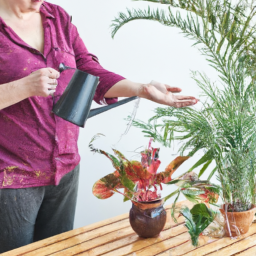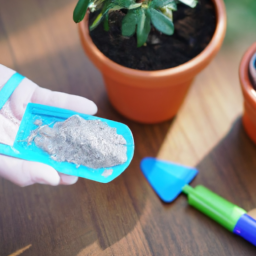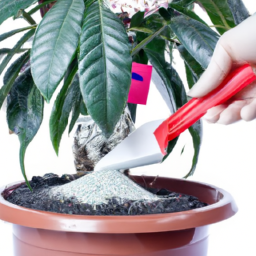
Winter can be a challenging time for indoor plants. With the colder temperatures and reduced sunlight, many plant owners wonder if they should continue fertilizing their green companions during this season. The answer to the question “Should I fertilize indoor plants in winter?” is not a straightforward one. While some plants may benefit from a boost of nutrients, others may prefer a period of rest. In this blog post, we will explore the factors to consider when deciding whether or not to fertilize your indoor plants during the winter months. So, if you’re unsure about how to best care for your leafy friends during this time of year, keep reading to find out if fertilizing is the right choice for your indoor plants in winter.
Benefits of Fertilizing Indoor Plants in Winter
During the winter months, many indoor plants go through a period of dormancy. This is a natural response to the decrease in sunlight and lower temperatures. However, this doesn’t mean that you should neglect your indoor plants during this time. Fertilizing indoor plants in winter can provide several benefits that help them thrive and remain healthy. In this article, we will explore the advantages of fertilizing indoor plants in winter and provide you with a step-by-step guide on how to do it effectively.
1. Promotes Growth and Nutrient Uptake
Indoor plants still require nutrients to support their growth, even during the winter months. Fertilizing your indoor plants in winter can provide them with the essential nutrients they need to thrive. The nutrients in fertilizers, such as nitrogen, phosphorus, and potassium, are crucial for promoting healthy growth, strong roots, and vibrant foliage.
When you fertilize your indoor plants in winter, you ensure they have access to the necessary nutrients, even when natural sources may be limited. This promotes optimal nutrient uptake and helps plants maintain their overall health and vitality. Additionally, fertilizing during winter can prepare your indoor plants for the upcoming growing season, ensuring they have a head start when spring arrives.
However, it’s important to note that you should adjust the frequency and dosage of fertilizers during winter. Indoor plants require less frequent fertilization during this time compared to the active growing season. Follow the instructions on the fertilizer packaging or consult a gardening expert to determine the appropriate dosage and frequency for your specific plants.
2. Prevents Nutrient Deficiencies
Indoor plants may experience nutrient deficiencies during winter due to reduced sunlight and slower growth. Fertilizing your plants can help prevent these deficiencies and ensure they receive a balanced supply of essential nutrients. Nutrient deficiencies can manifest as yellowing leaves, stunted growth, or overall poor plant health.
By providing your indoor plants with the necessary nutrients through fertilization, you can help them maintain their vibrant green color and prevent any signs of nutrient deficiencies. This is especially important for plants that are more prone to deficiencies, such as those with high nutrient requirements or specific nutritional needs.
Remember to choose a fertilizer specifically formulated for indoor plants and follow the instructions carefully to avoid over-fertilization, which can also lead to nutrient imbalances and harm your plants.
3. Improves Soil Health
Fertilizing indoor plants in winter not only benefits the plants themselves but also improves the overall health of the soil they are planted in. Over time, indoor plant soil can become depleted of nutrients, especially if the plants have been growing in the same pot for an extended period. Fertilizing helps replenish these nutrients and enhances the soil’s fertility.
When you fertilize your indoor plants, the nutrients gradually release into the soil, providing a long-lasting source of nourishment for the plants. This improves the soil structure, promotes beneficial microbial activity, and enhances nutrient availability for the roots.
Regular fertilization during winter ensures that your indoor plants have access to the nutrients they need to grow and thrive, while also maintaining the health and fertility of the soil. This creates an optimal environment for your plants and supports their overall well-being.
In conclusion, fertilizing indoor plants in winter offers several benefits, including promoting growth and nutrient uptake, preventing nutrient deficiencies, and improving soil health. By following a proper fertilization schedule and using the right type of fertilizer, you can ensure that your indoor plants remain healthy and vibrant even during the colder months. Remember to adjust the frequency and dosage of fertilizers to suit the specific needs of your plants. Happy gardening!
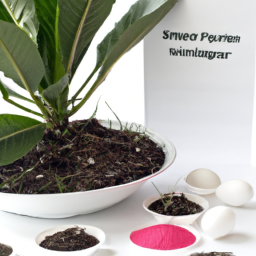
Should I Fertilize Indoor Plants in Winter?
As an expert in indoor plant care, I understand the importance of providing the right nutrients to your plants throughout the year. However, when it comes to fertilizing indoor plants in winter, there are several factors that need to be considered. In this article, I will guide you through these factors and help you make an informed decision about whether or not to fertilize your indoor plants during the winter season.
Factors to Consider Before Fertilizing Indoor Plants in Winter
1. Light Conditions
During winter, the days are shorter and sunlight is often limited. Indoor plants rely on light for photosynthesis, the process through which they convert light energy into chemical energy to fuel their growth. Without sufficient light, plants may not be able to utilize the nutrients provided by fertilizers effectively. Therefore, it is important to assess the light conditions in your home before deciding to fertilize your indoor plants in winter.
If your indoor plants are located in well-lit areas where they receive at least 6-8 hours of indirect sunlight, fertilizing them during winter can be beneficial. However, if your plants are situated in low-light areas or are not receiving adequate sunlight, it is best to hold off on fertilization until the days start getting longer and the light conditions improve.
Remember, over-fertilizing in low-light conditions can lead to nutrient buildup and cause harm to your plants. So, always prioritize light availability before deciding to fertilize.
2. Growth Patterns
Indoor plants have different growth patterns, and these patterns can vary during winter due to the change in environmental conditions. Some plants naturally go into a period of dormancy during winter, where their growth slows down or even stops temporarily. Fertilizing plants during this dormant period may not provide any significant benefits and can potentially harm the plants.
On the other hand, if your indoor plants continue to grow actively during winter, they may still benefit from occasional fertilization. Look for signs of new growth, such as fresh leaves or buds, to determine if your plants are actively growing. If they are, consider providing them with a diluted dose of fertilizer to support their growth during the winter months.
It’s important to note that not all indoor plants require fertilization during winter, even if they are actively growing. Some plants naturally have slower growth rates or prefer to be left unfertilized during this time. Research the specific needs of your plant species to ensure you are providing the appropriate care.
3. Temperature and Humidity
Winter brings colder temperatures and lower humidity levels, which can impact the nutrient uptake and overall health of indoor plants. Fertilizers are typically designed to work optimally within certain temperature and humidity ranges. In winter, the lower temperatures and drier air can slow down the microbial activity in the soil, making it harder for plants to absorb nutrients from the fertilizer.
Before fertilizing your indoor plants in winter, it is important to consider the temperature and humidity conditions in your home. If the temperature is consistently below the recommended range for the fertilizer you intend to use, it may be best to wait until the conditions improve. Similarly, if the humidity levels are extremely low, providing additional moisture through misting or using a humidifier can help create a more favorable environment for nutrient absorption.
Always ensure that the temperature and humidity conditions are suitable for the fertilizer to work effectively and be absorbed by the plants. This will help prevent nutrient imbalances and potential damage to your indoor plants.
By considering these factors – light conditions, growth patterns, and temperature/humidity – you can make an informed decision about whether or not to fertilize your indoor plants in winter. Remember, each plant is unique, so it’s essential to understand the specific needs of your indoor plants and adapt your care accordingly. With proper consideration and care, your indoor plants can thrive even during the winter months.
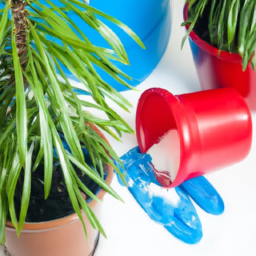
Should I Fertilize Indoor Plants in Winter?
As an expert in indoor plant care, I understand the importance of providing the right nutrients to our leafy friends. However, when it comes to fertilizing indoor plants in winter, there are a few factors to consider. In this article, we will explore the alternatives to fertilizing indoor plants during the winter months and provide you with a step-by-step guide on how to ensure your plants thrive even in the colder seasons.
The Role of Fertilizers
Fertilizers play a crucial role in supplying essential nutrients to plants, promoting healthy growth, and enhancing overall plant vigor. During the winter months, indoor plants tend to slow down their growth due to reduced light and lower temperatures. This natural slowdown in growth means that plants require fewer nutrients compared to the active growing season.
While it may be tempting to continue fertilizing your indoor plants throughout the winter, it is important to understand that excessive fertilization during this period can do more harm than good. Over-fertilization can lead to nutrient build-up in the soil, which can damage the plant’s roots and result in nutrient toxicity.
Now, let’s explore some alternatives to fertilizing indoor plants in winter to ensure their well-being and continued growth.
1. Adjusting Watering Practices
One of the most effective alternatives to fertilizing indoor plants in winter is adjusting your watering practices. During this period, plants require less water due to their reduced growth rate. Overwatering can lead to root rot and other moisture-related issues. To prevent this, it is essential to check the moisture levels in the soil before watering.
Insert your finger about an inch into the soil. If it feels dry, it’s time to water your plants. However, if the soil feels moist, it’s best to wait a little longer before watering. By adjusting your watering frequency and ensuring proper drainage, you can help your indoor plants maintain the right moisture balance and avoid the need for excessive fertilization.
Additionally, using room-temperature water is crucial during the winter months. Cold water can shock the plant’s roots, leading to stress and potential damage. Let the water sit for a while to reach room temperature before watering your plants.
2. Enhancing Light Exposure
Another alternative to fertilizing indoor plants in winter is to enhance their light exposure. As mentioned earlier, plants naturally slow down their growth during this period due to reduced light levels. By providing additional light, you can help compensate for this decrease and support healthier plant growth.
Place your indoor plants near windows that receive the most sunlight during the day. If natural light is limited, consider using artificial grow lights specifically designed for plants. These lights emit the right spectrum of light to promote photosynthesis and encourage plant growth.
It’s important to note that each plant has different light requirements. Research the specific light needs of your indoor plants and adjust their positioning accordingly. By providing adequate light, you can minimize the need for additional fertilization during the winter months.
3. Using Organic Soil Amendments
Organic soil amendments can be a great alternative to fertilizing indoor plants in winter. These amendments enrich the soil with beneficial nutrients over time, reducing the need for frequent fertilization. Examples of organic soil amendments include compost, well-rotted manure, and worm castings.
Prior to applying any organic soil amendments, ensure that the soil is already moist. This will help the nutrients to penetrate the soil effectively and be readily available to the plant’s roots. Apply the amendments according to the instructions on the packaging and gently work them into the top layer of soil.
Organic soil amendments not only provide essential nutrients but also improve the soil structure, water retention, and overall plant health. They are a natural and sustainable way to support your indoor plants during the winter months.
Remember, each plant has its own specific needs, so it’s important to research and understand the requirements of your indoor plants. By adjusting your watering practices, enhancing light exposure, and using organic soil amendments, you can provide the necessary care for your indoor plants during winter without relying heavily on fertilizers.
So, next time you find yourself wondering whether to fertilize your indoor plants in winter, consider these alternatives and give your leafy companions the care they deserve!
Crisp Recap
Winter can be a challenging time for indoor plants, as they face lower light levels and drier air. As a plant parent, you may wonder if fertilizing your indoor plants during this season is necessary or if it could do more harm than good. Well, the answer isn’t quite black and white. While indoor plants generally have slower growth during winter, they still need nutrients to thrive. However, it’s important to adjust your fertilizing routine to accommodate their changing needs.
During winter, most indoor plants experience a dormant period where their growth slows down. This means they require less fertilizer compared to the warmer months. Over-fertilizing can lead to salt build-up in the soil, which can harm the plant’s roots. It’s best to err on the side of caution and reduce the frequency of fertilizing during this time. Instead of sticking to your regular schedule, consider fertilizing every 6-8 weeks or even every 2-3 months. Additionally, opt for a diluted fertilizer solution to avoid overwhelming your plants with excessive nutrients. Remember, moderation is key when it comes to fertilizing indoor plants in winter.
Frequently Asked Questions from our readers:
Q1: Should I fertilize indoor plants in winter?
A1: Yes, it is generally recommended to fertilize indoor plants during winter, but with some adjustments. While plants tend to grow slower during this season, they still require nutrients to stay healthy. However, it is important to be mindful of the specific needs of your plants and adjust the frequency and type of fertilizer accordingly.
Q2: How often should I fertilize indoor plants in winter?
A2: In winter, indoor plants generally require less frequent fertilization compared to other seasons. It is advisable to fertilize them about once every 6-8 weeks, or even once every 2-3 months. This allows the plants to absorb the nutrients at a slower pace, preventing overfeeding and potential damage to their roots.
Q3: What type of fertilizer should I use for indoor plants in winter?
A3: When selecting a fertilizer for your indoor plants in winter, it is best to opt for a balanced, water-soluble fertilizer. Look for a formula with equal or near-equal amounts of nitrogen, phosphorus, and potassium (N-P-K) to provide a well-rounded nutrient supply. Additionally, consider using a fertilizer specifically formulated for houseplants, as they often contain the necessary micronutrients.
Q4: Is there anything I should avoid when fertilizing indoor plants in winter?
A4: Yes, there are a few things to avoid when fertilizing indoor plants during winter. Firstly, refrain from over-fertilizing, as this can lead to salt buildup in the soil and harm the plants. Also, avoid using slow-release fertilizers during this season, as they may release nutrients too rapidly due to the lower temperatures. Lastly, be cautious not to apply fertilizer to dry soil, as it can potentially damage the roots. Always water the plant thoroughly before fertilizing.
Q5: Are there any signs that indicate my indoor plants need fertilizing in winter?
A5: Yes, there are a few signs that can indicate the need for fertilization in winter. If you notice stunted growth, pale or yellowing leaves, or a general decline in plant health, it may be a sign that your indoor plants require additional nutrients. However, it’s important to assess other factors, such as lighting and watering, before concluding that fertilization is necessary. If in doubt, consult a plant expert or horticulturist for further guidance.

James Wong is a renowned ethnobotanist, plant scientist, and local television presenter. With a passion for demystifying plant science, he is known for translating complex botanical concepts into practical advice for everyday plant enthusiasts. James’s expertise spans from traditional gardening to cutting-edge plant technologies, making his insights accessible and informative.

